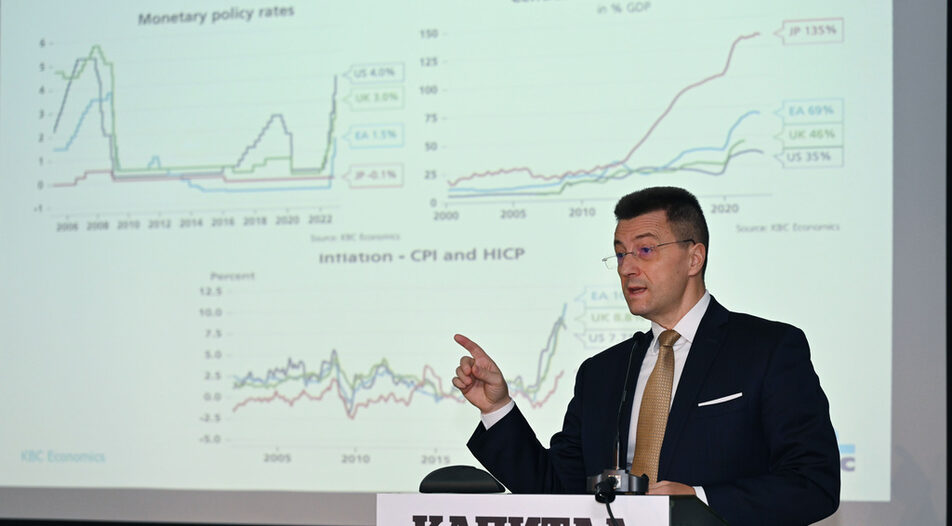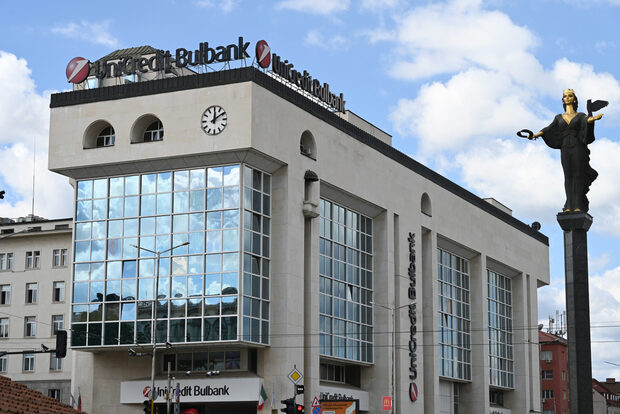Analysts of the Belgian KBC Group posit the likelihood of "soft recession", which is currently estimated at 60% probability. The danger of it becoming deeper is 35%, and the chance to scale back is only 5%, as this depends on the escalation of the war in Ukraine. The Chief Executive Officer in the International Markets department of Belgium KBC Group, Petar Andonov, outlined this picture during the "Banks and Business" conference, organized by Capital Weekly.
Key factors are the duration of the conflict in Ukraine, Europe's gas supply, the dynamics of core and general inflation, and the fiscal and monetary response to events. However, uncertainty is ever present and every forecast can be revised.
"Last year I said I was a cautious optimist, emphasizing the optimist part of the phrase, and now I say I am a cautious optimist but emphasizing the cautious part," Andronov joked.
War until the summer of 2023
Andronov claims that, unfortunately, one cannot bet on a quick end to the conflict, since, according to Western military experts, Russia has the capacity and arsenal to continue its war at least until the middle of 2023. At the same time, Western countries' support for Ukraine is reaching a critical juncture. Hence he believes that the conflict will continue for at least another six months, and perhaps much longer.
Storage facilities of gas are over 95% full and almost all countries have at least a hundred days' worth of supplies, so concerns about the current winter are diminishing. "The current winter will be hard for the European continent, but the next one will be harder still," predicts Andronov.
Growth just above zero
KBC forecasts a decline in the current quarter and the first quarter of 2023 for both US and eurozone GDP, followed by a return to positive numbers. However, the bank sees growth in most leading economies (except the UK) for the whole of 2023. For the CEE countries where KBC is presented, the forecasts are in the range of 0-0.8%, and for Bulgaria, it is among the higher levels - 0.7%.
Andronov outlined the differences in inflation trends in the USA and Europe. Overseas, inflation consists largely of core inflation, which remains stubbornly high, but in recent months there has been a reduction in non-core inflation, which is driven by energy and food. Therefore, it can be expected that general inflation (at last recorded levels of 6.7%) will decrease. In Europe, the worsening trend continues until October, and non-core inflation is prevalent. "From this point of view, the European Central Bank's task seems even more difficult," the banker said.
In addition, he says that both in the USA and in Europe, wage growth is moving relatively closely in line with inflation. In recent months, however, Europe has been lagging sharply, with the difference jumping to nearly 6 percentage points, hence incomes do not compensate for rising prices. "This is a recipe for social discontent, for serious protests and an incitement of tensions," predicts Andronov. He says that governments will be forced to raise wages. "If this happens, core inflation will be further strengthened," he adds.
Nearly 1.5 more points of tightening
Andronov says it is normal to expect the ECB to become more aggressive and adopt a 4% interest rate, and the Federal Reserve - 1.5%, but it is quite the opposite. "Central banks, in addition to the legacy of their monetary expansion, must also contend with the fiscal support that enters the economies," he noted.
KBC's expectations are for the Federal Reserve to reach nearly 5-5.25% interest rate and for the ECB - 3-3.25%. The latest data for declining inflation in the Eurozone in November gives optimism to the markets, but according to Andronov, it is exaggerated and will not be sustained.
Separately, in those EU countries with floating exchange rates, the problems are more acute - due to the need to protect their currencies, states had to raise their interest rates more sharply - up to 13% in Hungary and 7% in the Czech Republic. This now also triggers negative side effects such as a decline in lending, shrinking foreign reserves, spikes in interest rates and a rise in non-performing loans.
Analysts of the Belgian KBC Group posit the likelihood of "soft recession", which is currently estimated at 60% probability. The danger of it becoming deeper is 35%, and the chance to scale back is only 5%, as this depends on the escalation of the war in Ukraine. The Chief Executive Officer in the International Markets department of Belgium KBC Group, Petar Andonov, outlined this picture during the "Banks and Business" conference, organized by Capital Weekly.
Key factors are the duration of the conflict in Ukraine, Europe's gas supply, the dynamics of core and general inflation, and the fiscal and monetary response to events. However, uncertainty is ever present and every forecast can be revised.










